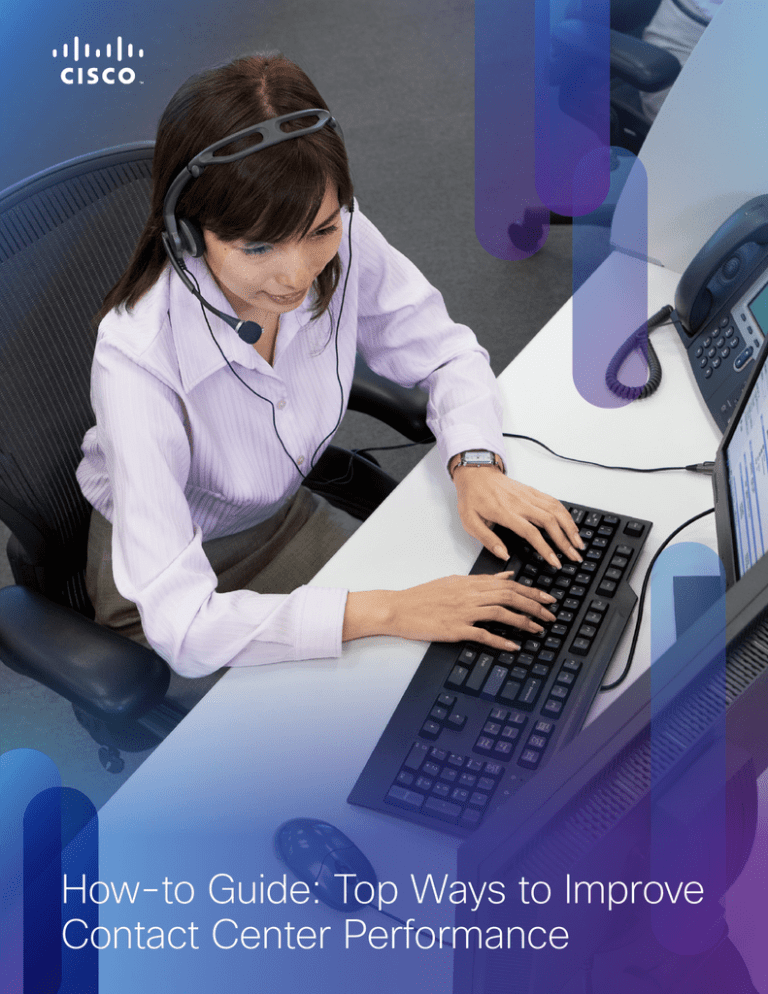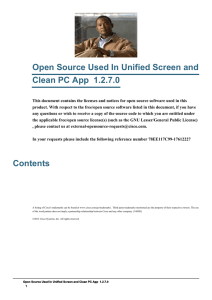
How-to Guide: Top Ways to Improve
Contact Center Performance
How-to Guide:
Top Ways to Improve Contact Center Performance
White Paper
HOW ADVANCED TECHNOLOGY IS HELPING CONTACT CENTERS ACHIEVE KEY
PERFORMANCE INDICATORS
Executive Summary
Recent studies have demonstrated a positive relationship between the implementation of advanced technology
in contact centers and increased caller satisfaction. For example, advanced call handling techniques reduce
average queue time by anywhere from 12 to 43 percent. Calls per hour per agent improved 6 to 18 percent.
And self-service options were shown to increase satisfaction among the least satisfied callers from 39 to
66 percent. In this paper, you will learn more about the ways in which advanced technology is transforming
contact center productivity.
Questioning Assumptions and Finding Answers
Organizations spend millions of dollars annually on contact center technology to help improve customer
satisfaction, become more competitive, and reduce the cost of acquiring and retaining loyal customers. It is
commonly assumed that technology investment delivers measurable results—but does it?
“ ...advanced contact
center technologies
could simultaneously
improve customer
satisfaction and financial
performance.”
The Impact of Technology on
Contact Center Performance
— Benchmark Portal study
In the past, there have not been statistically valid research studies to support that
assumption. However, the recent Benchmark Portal study, The Impact of Technology
on Contact Center Performance, provides positive, statistically relevant evidence
that advanced contact center technologies actually do improve customer interactions.
Based on rigorous research conducted with 143 contact centers from a wide range
of industries, the study found that advanced contact center technologies could
simultaneously improve customer satisfaction and financial performance. In addition, the
study found that technology investments in contact center technology frequently pay
for themselves in one to two years and deliver higher return on investment (ROI) than
investments made in core products and services.
Over the past 20 years, contact centers have implemented a range of technology
solutions to continuously improve responsiveness to customers and cost-effectiveness.
As technologies have become more advanced, contact centers build on their
capabilities to gain more insight into customer interactions and improve customer care.
© 2013 Cisco and/or its affiliates. All rights reserved.
Page 2 of 6
How-to Guide:
Top Ways to Improve Contact Center Performance
White Paper
Stages of Contact Center Innovation
Contact Center Improvements
At a Glance
First-call resolution rates
+ 4-13 percent
Cost per call reductions
Up to 35 percent
Increased satisfaction among
satisfied customers
+5-7 percent
Increased satisfaction among
least satisfied customers
+39-66 percent
Contact center technologies took a large step forward in the 1980s. Since that time, those
early technologies have been refined and augmented to achieve three primary goals:
• Manage costs: During the 1980s and 1990s, 800-service, reporting, interactive
voice response (IVR) and workforce optimization solutions were implemented to
drive efficiency and reduce costs. Today, analytics and virtual desktop solutions are
enabling contact centers to perform highly granular analysis and support customers
from wherever agents are located to further reduce infrastructure costs, increase
employee convenience, and target customer satisfaction efforts.
• Segment customers: Customer relationship management (CRM) and intelligent
routing capabilities introduced in the 1990s enabled contact centers to segment
customers for targeted offers or priority treatment. Today, this data plus integrated
customer analytics are helping organizations develop individualized customer profiles
to support personalized service and marketing.
• Collaborate with customers: The third goal is to collaborate with customers.
Customer collaboration encompasses integrating existing contact center capabilities
with social media, social mining, and crowd sourcing to increase customer loyalty and
gain near-real-time insight into customer preferences, opinions, and feedback. This
data is used to help the company further improve processes ranging from customer
service to product development.
Today’s contact centers must achieve cost control and customer segmentation goals
before they can effectively engage in customer collaboration. And according to the
Benchmark Portal study, they are using advanced contact center technologies to
improve performance against eight Key Performance Indicators (KPIs).
• Improve first call resolution rates
• Reduce costs per call
• Improve top box customer satisfaction
• Improve bottom box customer satisfaction
Calls per agent per hour
+6-18 percent
• Improve calls per agent per hour
• Improve top box agent satisfaction
• Reduce average queue time
• Improve multi-channel performance
Agent satisfaction
+4-11 percent
Average queue time reductions
12-43 percent
© 2013 Cisco and/or its affiliates. All rights reserved.
Page 3 of 6
How-to Guide:
Top Ways to Improve Contact Center Performance
White Paper
Improve First Call Resolution Rates
Contact centers in the Benchmark Portal study improved first call
resolution rates by 4-13 percent compared to centers that do
not have these technologies. Technology is critical to calls being
received and routed correctly. When callers are routed correctly
and agents have the proper desktop technologies, calls are more
likely to be resolved the first time.
As described in the study, if a contact center handles 2 million
calls per year and achieves a 7-percent improvement in first call
resolution at an average cost per call of $5.05, the center would
save $707,000 annually. Using the same scenario, if the call
center’s data indicates that caller satisfaction improves 1 percent
for every 2-percent improvement in first call resolution, the center
could expect a 3.5 percent increase in caller satisfaction. The
advanced technologies supporting these gains include:
“ As described in the
study, if a contact
center handles 2 million
calls per year and
achieves a 7-percent
improvement in first call
resolution at an average
cost per call of $5.05,
the center would save
$707,000 annually.”
• Contact data analytics
The Impact of Technology on
Contact Center Performance
— Benchmark Portal study
• Advanced routing
• Advanced reporting and analytical tools
Reduce Costs Per Call
Cost per call is derived by dividing the budget for the period by the number of calls handled in the center
for the same period. Contact centers reduced cost per call by as much as 35 percent using technologies
including:
• Presence-based expert escalation
• Multi-criteria skills-based routing
• Courtesy callbacks
• Computer telephony integration (CTI) and applications
Improve Top Box Customer Satisfaction
Top box customers are those who rate their overall satisfaction
with an interaction as 5 out of 5. Satisfaction among alreadysatisfied callers improved even more—by 5-7 percent.
Organizations that reported these gains properly staff their
centers and gather data to continuously improve their processes
using these technologies:
• Workforce management
• Contact data analytics
• Cradle-to-grave reporting
© 2013 Cisco and/or its affiliates. All rights reserved.
Page 4 of 6
How-to Guide:
Top Ways to Improve Contact Center Performance
White Paper
Improve Bottom Box Satisfaction
Bottom box customers are those who rate their overall satisfaction with an interaction as 1 out of 5. Contact
centers that improved this KPI use self-service options that enable customers to avoid longer waiting times and
technologies that enable them to identify and correct agent behaviors that can lead to caller dissatisfaction.
These centers increased bottom box satisfaction by 39-66 percent using:
• Workforce management
• Speech recognition
• Call recording and retrieval
• Touch-tone IVR
Improve Calls Per Agent Per Hour
Statistically, advanced technologies help agents become more effective and efficient. Customers are
connected to the person best able to help them, and agents have customer, product, and service information
immediately accessible. Contact centers improved calls per hour per agent by 6-18 percent using
technologies including:
• Multi-criteria routing
• CTI and apps integration
• Presence-based expert escalation
• Unified cross-channel routing
• Natural language IVR
Improve Top Box Agent Satisfaction
Top box agents are those who rate their overall satisfaction with their work as the top score on a five-point scale.
Agents want to help customers and become stressed and frustrated with systems that are slow, lock up,
or don’t provide the information they need. High levels of agent satisfaction reduce turnover, lower costs,
and indicate that people, processes, and technology are working well together. Top box agent satisfaction
increased by 4-11 percent through technologies such as:
• Advanced reporting and analytics
• Agent desktop with CTI
• CTI and apps integration
• Real-time agent feedback tools
Reduce Average Queue Time
The more agents there are, the faster customers will be served. However, advanced technologies can expedite
call handling to reduce annoying queue times without requiring additional agents. Contact centers using
advanced technologies reduced average queue time by 12-43 percent. Technologies implemented include:
• Presence-based expert escalation
• Courtesy callback while in queue
• Blended routing
• Multi-criteria routing
© 2013 Cisco and/or its affiliates. All rights reserved.
Page 5 of 6
How-to Guide:
Top Ways to Improve Contact Center Performance
White Paper
Improve Multi-channel Performance
Multi-channel performance includes measuring email and chat response, in addition to phone. Contact centers
that handle a growing volume of email and chat traffic can benefit from several technologies to help reduce
costs and increase responsiveness:
• CTI and apps integration
• Universal multi-channel queue
• Unified cross-channel routing
Cisco Customer Collaboration Solutions
Businesses around the world are using Cisco Customer Collaboration solutions to improve contact center and
financial performance. Cisco was ranked first in “Ability to Execute” in the 2012 and 2013 Gartner Contact
Center Infrastructure Magic Quadrant, making Cisco the smart, safe choice for business contact centers.
• Broad product portfolio: Cisco continuously extends its solutions and capabilities to help customers meet
current and emerging technology needs. A wide range of deployment options gives customers flexibility to
gain advanced technology solutions regardless of location, number of agents, or delivery model.
• Next-generation customer collaboration: Cisco Customer Collaboration solutions provide innovative
capabilities that transform customer care from simple phone transactions into personalized, content-rich
experiences across any communication channel chosen by customers.
• Virtual capabilities: Virtualization technologies provide extraordinary flexibility to add agents and supervisors
regardless of physical location. Businesses can quickly adapt to meet changing customer demands from
headquarters,Asia
branch
offices,
mobile, or remote locationsEurope
while Headquarters
reducing costs.
Pacific
Headquarters
Americas Headquarters
Cisco Systems, Inc.
San Jose, CA
Cisco Systems (USA) Pte. Ltd.
Cisco Systems International BV Amsterdam,
• Investment protection:
center while building on existing technology
The Netherlands
Singapore Advance the capabilities of your contact
and implementing industry-best third-party applications.
Cisco has more than 200 offices worldwide. Addresses, phone numbers, and fax numbers are listed on the Cisco Website at www.cisco.com/go/offices.
Cisco and the Cisco logo are trademarks or registered trademarks of Cisco and/or its affiliates in the U.S. and other countries. To view a list of Cisco trademarks,
go to this URL: www.cisco.com/go/trademarks. Third party trademarks mentioned are the property of their respective owners. The use of the word partner does
not imply a partnership relationship between Cisco and any other company. (1110R)
For More Information
Improved caller satisfaction and contact center performance can be achieved using advanced technologies.
To learn more about the results that contact centers achieved in the Benchmark Portal study, view
The Impact of Technology on Contact Center Performance.
For more information about Cisco Customer Collaboration solutions, visit www.cisco.com/go/cc.
Americas Headquarters
Cisco Systems, Inc.
San Jose, CA
Asia Pacific Headquarters
Cisco Systems (USA) Pte. Ltd.
Singapore
Europe Headquarters
Cisco Systems International BV Amsterdam,
The Netherlands
Cisco has more than 200 offices worldwide. Addresses, phone numbers, and fax numbers are listed on the Cisco Website at www.cisco.com/go/offices.
Cisco and the Cisco logo are trademarks or registered trademarks of Cisco and/or its affiliates in the U.S. and other countries. To view a list of Cisco trademarks, go
to this URL: www.cisco.com/go/trademarks. Third party trademarks mentioned are the property of their respective owners. The use of the word partner does not imply
a partnership relationship between Cisco and any other company. (1110R)





